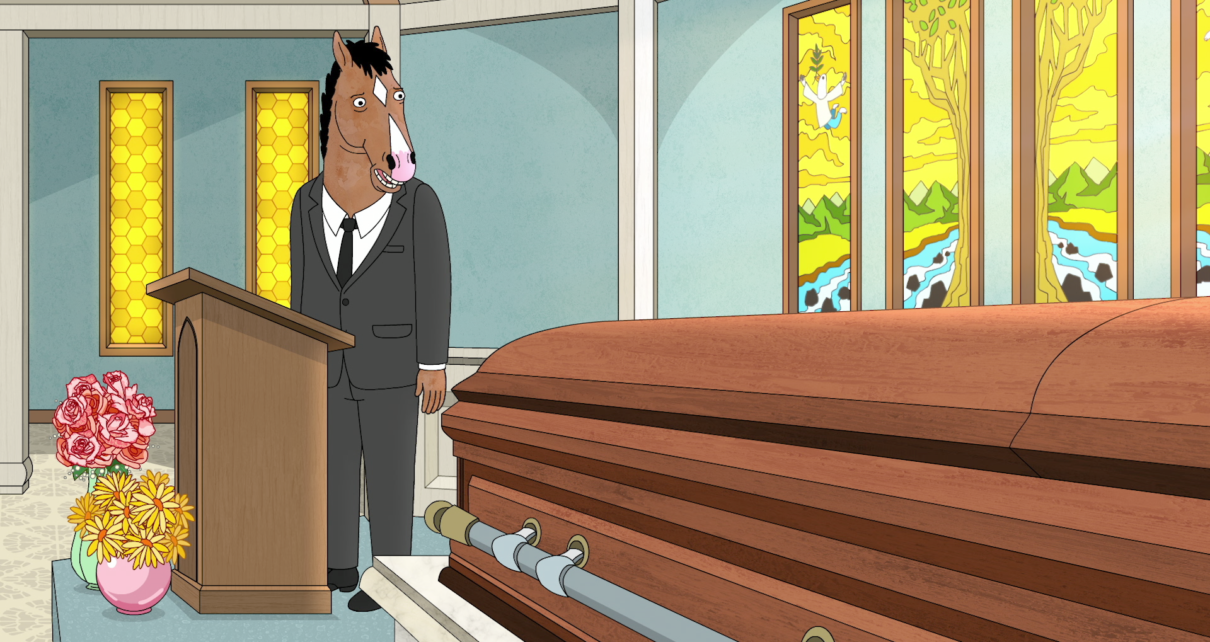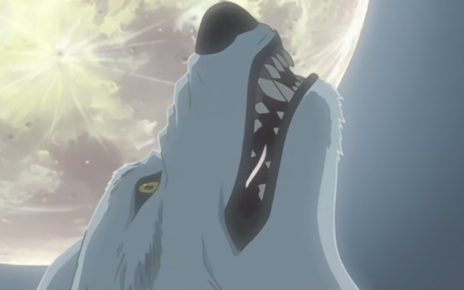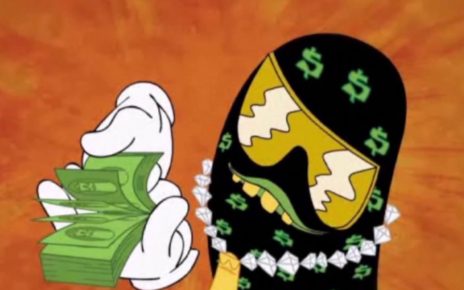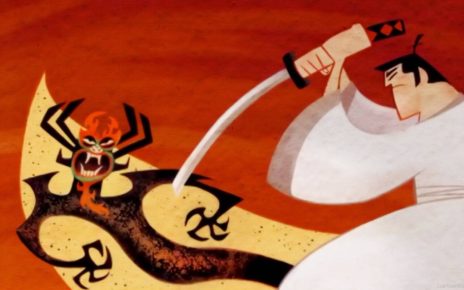
Welcome to What Horse Is He Right Now Dot Com, a collection of stories by The Dot and Line about BoJack Horseman. Spoilers for Season 5 follow.
Every single character on BoJack Horseman is emotionally damaged. It’s pretty much a given. BoJack himself is an alcoholic, drug-addicted abuser who has himself been a victim of abuse. And like a car crash on a highway, we all stop to watch. Every year, the show has made a habit of ratcheting its tense portrayal of emotional trauma up higher and higher, to the point where we’ve asked before “Why? Why would you watch this show?”
True to form, of course, BoJack’s fifth season doesn’t let up at all. In fact the show happens to reach a sort of apotheosis of its own miserablist outlook with its sixth episode, “Free Churro,” aka “The One Where BoJack Treats His Mom’s Funeral Like a Stand-Up Set”—complete with joke-y musical cues.
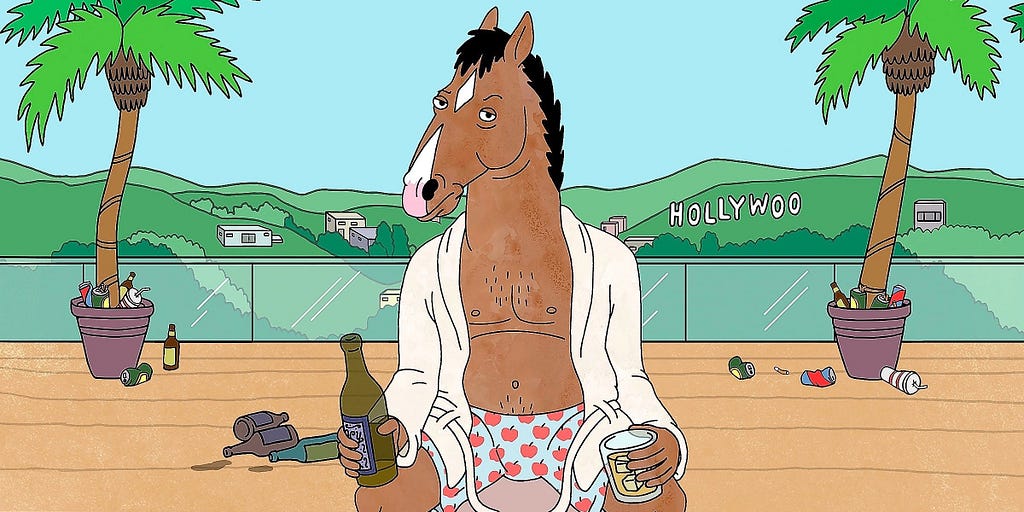
“Free Churro” is remarkable on many different levels. For starters, it’s one of the show’s many bottle episodes—with the exception of its cold open, a flashback to BoJack’s childhood memory of his father, Buttterscotch, complaining to him about his mother, Beatrice. The rest of the episode consists of an unbroken monologue by BoJack in the present day, delivering a rambling, bitter eulogy for Beatrice at a closed-casket funeral. Throughout the episode, the focus is on BoJack: how he’s processing his own shades of grief and mirth over the fact that one his abusers is dead. The fact that the abuser in question happens to be his mother gives the episode its tension, but we only see BoJack almost the entire time—a canny storytelling move given that he keeps returning to one phrase: “I see you.”
It’s the last thing that Beatrice said to BoJack before she kicked the bucket, and a line rife with meaning, given that she was suffering from dementia at the end of the last season. BoJack himself struggles with why this of all things could have been her final words to him in this world.
That’s the the last thing she said to me. “I see you.” Not a statement of judgment or disappointment, just acceptance and the simple recognition of another person in a room. “Hello there. You are a person. And I see you.” Let me tell you, it’s a weird thing to feel at 54 years old, that for the first time in your life your mother sees you. It’s an odd realization that that’s the thing you’ve been missing, the only thing you wanted all along, to be seen. And it doesn’t feel like a relief, to finally be seen. It feels mean. Like, “Oh it turns out that you knew what I wanted, and you waited until the very last moment to give it to me.”
I was prepared for more cruelty. I was sure that she would get in one final zinger about how I let her down, and about how I was fat and stupid, and too tall to be an effective Lindy Hopper. How I was needy and a burden and an embarrassment. All that I was ready for. I was not ready for “I see you.” Only my mother would be lousy enough to swipe me with a moment of connection on her way out.
There’s a lot going on here, and Will Arnett navigates the material masterfully. You can hear the vitriolic spit in his delivery and the ideas BoJack is coming to terms with even as he speaks. Perhaps his mother had a final moment of clarity. Perhaps she regretted her treatment of BoJack toward the end of her life. Perhaps she was reading a sign in the hospital where she died that read “I.C.U.” The point of the episode, in large part, is that BoJack doesn’t know and will never know, and he has to deal with that.
And he tries. For almost all of this 25-minute episode, he vacillates between excoriating her for the way she treated him growing up, promoting his own work on Horsin’ Around, remembering the brief flashes of happiness he can point to in her life, and grieving—hard. At the end of it, he doesn’t really get a form of catharsis or come to many real conclusions beyond “everything is worse now.” Then he lifts the closed casket and the joke is on him: he was in the wrong funeral the whole time and was speaking to an audience of literal lizard people.
Cut to credits. Sharp exhale.
That sharp exhale is the most crucial element of the audience’s interaction with a show like BoJack Horseman. Its dives into self-destruction, addiction, physical violence, alcoholism, and character death are so unrelenting it can feel like the show relishes the pain. You need to take breaks between episodes. You need to chase it with cat videos. You need to remind yourself that your real world isn’t quite this bad.
Most TV shows don’t really operate with quite the same commitment to existential dread. Mad Men, which probably came closest, was a lot more buoyant. Rick and Morty, so often compared to BoJack and vice-versa, espouses an arguably more bitter view of the world. Venture Bros, which deployed many of the same narrative tactics, doesn’t seem to share BoJack’s long-term strategy; it’s a show that, at its worst, does have a real compassion for its lead characters.
In Season 5, it’s harder than ever to say whether the show has any compassion left for the character of BoJack Horseman. A few months after his eulogy, he admits to Diane that he’s been responsible for a slew of “shady” behavior when she confronts him about his past relationship with 17-year-old Penny. He puts his younger sister, Hollyhock, in jeopardy in pursuit of opioids. He allows his drug habit to boil over, physically assaulting and nearly killing his fellow cast member-turned-girlfriend on the set of their TV show.
BoJack Horseman is smart enough to understand that the salve for all of this isn’t self-care or days spent at the spa. “If there were any justice, you would be in jail right now,” his last victim in the season, Gina Cazador, says venomously—and she’s right.
Too often, there isn’t any justice in the real world, let alone time to exhale. Too often, the likes of Clarence Thomas or Harvey Weinstein or Louis C.K. or Brett Kavanaugh or Bill Cosby or Les Moonves or Roger Ailes get a pass or a mistrial or a fat severance or to go with their departure from the limelight. Like worms, they come wriggle their way into comebacks or try to even to ascend to the Supreme Court.
BoJack Horseman, more sensitive than ever to the issue of bad men, doesn’t give its star a comeback before the season ends, but I’m curious what that will look like next season. It’s still a TV show—classified as a comedy—and its characters’ broken lives echo the problems we obsess over in our own world. We identify with it and take (some, a little) comfort in that when the show accomplishes it effectively. But in BoJack, the spaces to exhale have shrunk, filled instead with more pain, more dread, more peril for those characters. Like BoJack’s relationship with his mother, we all went into this season “prepared for more cruelty,” because that’s what the show has taught us to expect after five seasons.
How much more pleasure can we derive from all this pain? I adore this show, and I don’t know.

Thanks for reading The Dot and Line, where we talk about animation of all kinds. Don’t forget to for this article and follow us on Twitter and Facebook.


